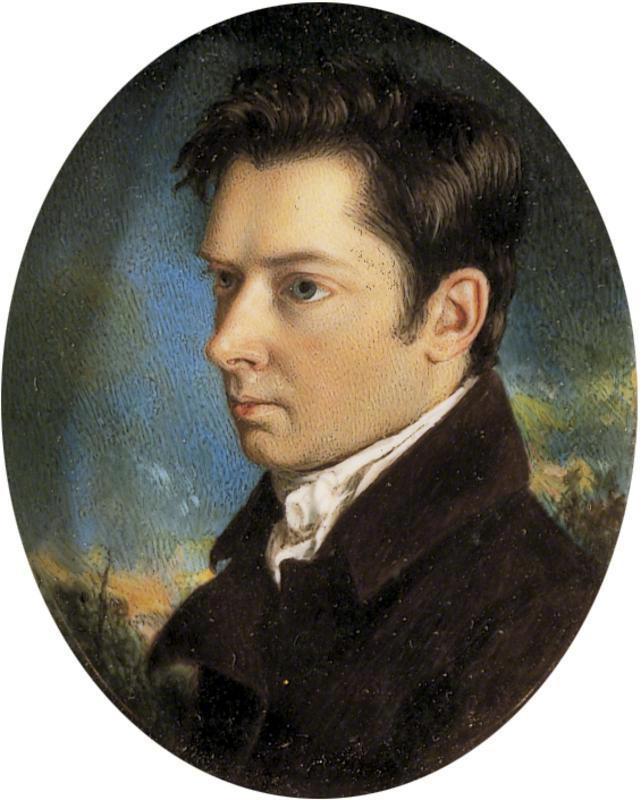William Hazlitt Berühmte Zitate
„Es ist besser, weder lesen noch schreiben zu können, als weiter nichts zu können.“
Table Talk, 1821 - 1822
William Hazlitt: Zitate auf Englisch
No. 112
Characteristics, in the manner of Rochefoucauld's Maxims (1823)
No. 54
Characteristics, in the manner of Rochefoucauld's Maxims (1823)
"On the Disadvantages of Intellectual Superiority"
Table Talk: Essays On Men And Manners http://www.blupete.com/Literature/Essays/TableHazIV.htm (1821-1822)
“But there is an unseemly exposure of the mind, as well as of the body.”
"On Disagreeable People"
Men and Manners: Sketches and Essays (1852)
"On Will-Making"
Table Talk: Essays On Men And Manners http://www.blupete.com/Literature/Essays/TableHazIV.htm (1821-1822)
" On The Want Of Money," http://www.blupete.com/Literature/Essays/Hazlitt/Money.htm Monthly Magazine (January 1827), reprinted in The Collected Works of William Hazlitt (1902-1904)
" On Disagreeable People http://www.blupete.com/Literature/Essays/Hazlitt/Disagreeable.htm" (August 1827)
Men and Manners: Sketches and Essays (1852)
No. 416
Characteristics, in the manner of Rochefoucauld's Maxims (1823)
Burke and the Edinburgh Phrenologists in The Atlas (15 February 1829); reprinted in New Writings by William Hazlitt, William Hazlitt and Percival Presland Howe (ed.), (2nd edition, 1925), p. 117; also reprinted in The Complete Works of William Hazlitt, Volume 20: Miscellaneous writings, (J.M. Dent and Sons, 1934), (AMS Press, 1967), p. 201
“Death is the greatest evil, because it cuts off hope.”
No. 35
Characteristics, in the manner of Rochefoucauld's Maxims (1823)
"On the Conversations of Lords," New Monthly Magazine (April 1826)
Men and Manners: Sketches and Essays (1852)
No. 132
Characteristics, in the manner of Rochefoucauld's Maxims (1823)
“It is better to be able neither to read nor write than to be able to do nothing else.”
"On the Ignorance of the Learned"
Table Talk: Essays On Men And Manners http://www.blupete.com/Literature/Essays/TableHazIV.htm (1821-1822)
"On Living to One's-Self"
Table Talk: Essays On Men And Manners http://www.blupete.com/Literature/Essays/TableHazIV.htm (1821-1822)
“No young man believes he shall ever die.”
"On the Feeling of Immortality in Youth"
Table Talk: Essays On Men And Manners http://www.blupete.com/Literature/Essays/TableHazIV.htm (1821-1822)
“The perfect joys of heaven do not satisfy the cravings of nature.”
"On the Literary Character" (28 October 1813)
The Round Table (1815-1817)
"On Cant and Hypocrisy"
Men and Manners: Sketches and Essays (1852)
“The soul of a journey is liberty, perfect liberty, to think, feel, do just as one pleases.”
"On Going on a Journey"
Table Talk: Essays On Men And Manners http://www.blupete.com/Literature/Essays/TableHazIV.htm (1821-1822)
"Jeremy Bentham http://en.wikisource.org/wiki/The_Spirit_of_the_Age/Jeremy_Bentham
The Spirit of the Age (1825)
"On Old English Writers and Speakers" (1825)
The Plain Speaker (1826)
“We can scarcely hate any one that we know.”
"Why Distant Objects Please"
Table Talk: Essays On Men And Manners http://www.blupete.com/Literature/Essays/TableHazIV.htm (1821-1822)
“All that is worth remembering in life, is the poetry of it.”
Lectures on the English Poets http://www.gutenberg.org/files/16209/16209.txt (1818), Lecture I, "On Poetry in General"
No. 388
Characteristics, in the manner of Rochefoucauld's Maxims (1823)
“Some one is generally sure to be the sufferer by a joke.”
"On Wit and Humour"
Lectures on the English Comic Writers (1819)
"On Great and Little Things"
Table Talk: Essays On Men And Manners http://www.blupete.com/Literature/Essays/TableHazIV.htm (1821-1822)
"Whether Genius is Conscious of its Powers?"
The Plain Speaker (1826)
“Man is a make-believe animal — he is never so truly himself as when he is acting a part.”
Notes of a Journey through France and Italy (1824), ch. XVI
“Satirists gain the applause of others through fear, not through love.”
No. 72
Characteristics, in the manner of Rochefoucauld's Maxims (1823)
" On the Pleasure of Hating http://www.blupete.com/Literature/Essays/Hazlitt/Hating.htm" (c. 1826)
The Plain Speaker (1826)
“When a thing ceases to be a subject of controversy, it ceases to be a subject of interest.”
"On The Spirit of Controversy," The Atlas (30 January 1830), reprinted in The Collected Works of William Hazlitt (1902-1904)
